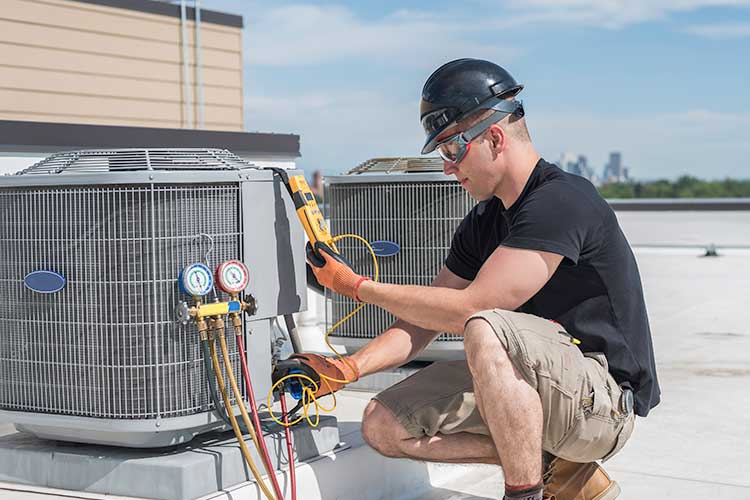If you’re a veteran looking to transition from military service into the civilian workforce, read on for seven reasons why HVAC is a Great Career For Veterans, and HVAC is an ideal career choice!
For all those who have served or are currently serving in the U.S. military, transitioning back to civilian life can be a major question mark. Armed service provides a lot of structure and purpose. It lets you help others in a physical, hands-on way. So where do you take all that energy and drive once you leave the uniform?
Explore why HVAC is a great career for veterans and how they can use their skills from the military to make it successful.
Discover 7 Reasons Why HVAC Is A Great Career For Veterans
One career that veterans find to be a good fit is becoming a heating, ventilation, and air conditioning (HVAC) technician. HVAC techs are trained to work on the complex heating, cooling, refrigeration, and ventilation systems that are part of almost every commercial or residential project constructed.
They do everything from the initial installation, inspections and testing, maintenance and troubleshooting, and repair and replacement of malfunctioning parts. HVAC techs can even specialize in certain systems or get certified to work on the latest products, like solar panels. And while everyone is different regarding what they’re looking for in a new career, we’ve got 7 reasons HVAC is a great career for veterans.
1. You’ll have job stability and security.
Because HVAC systems are used absolutely everywhere, there’s a need for HVAC technicians absolutely everywhere, too. In California alone, there are over 32,000 HVAC workers, and the Employment Development Department projects that thousands of more jobs will be added to this field by 2028. Getting HVAC training ensures that you’re stepping into a secure field, where you won’t have to worry so much about bouncing from job to job, hoping there will be an opportunity available for you.
2. You can potentially minimize your student debt.
Unlike taking on the monetary burden of a four-year degree from a traditional university, HVAC training is an opportunity to minimize your debt load. Career colleges and technical schools can get you trained and job-ready in a much shorter timeframe. At ATA College, for example, we have an HVAC Technician program that can be completed in as little as 10 months and heavily prioritizes hands-on learning and practical experience.
3. Your skills are easy to transfer across the country.
We mentioned above that HVAC technicians are needed everywhere, and that means you’ll have skills that serve as a safety net, whether you stay in California or move somewhere out of state. A good, accredited HVAC training program, like at ATA, will offer certification prep classes so that you’re ready to sit for the certificates and licensures you’ll need when you step into the job market.
4. You’ll be able to help and serve people.
They don’t call it military service for no reason. As a member of the armed forces, you were willing to dedicate yourself to protecting and helping other people. As an HVAC technician, you can continue that purpose in a slightly different arena by helping ensure that the vital heating and cooling systems that we rely so heavily on stay safe and functional.
5. You can continue to build your hands-on skills.
One of the most important reasons why HVAC is a great career for veterans is post-service, where you’re constantly being challenged physically and mentally; it might be tough to consider shifting to a stationary job, like an office.
As an HVAC technician, you can stay moving, even as you build on the hands-on skills you already gained in the military. HVAC work is often physical both in big ways — moving parts and equipment — and in small ways — making small repairs that require skill. It also provides mental challenges when it comes to troubleshooting and diagnosing issues.
6. You can work independently, even as a team member.
In general, HVAC businesses are structured like this: there’s a team of skilled technicians who are sent out on individual calls or jobs. So while you have the backing and camaraderie of a whole group of professionals just like you, you also have the freedom and independence to run your jobs as you see fit.
7. You’ll be able to take advantage of an industry full of innovation.
One of the great parts of the HVAC field is that it’s always innovating, and right now, in particular, is a dynamic one. As heating and cooling systems shift with the changeover to carbon-neutral energy sources and look to become more sustainable, there is a great opportunity to get in on the ground floor of this new technology. Training to become an HVAC technician in 2022 gives you the advantage to incorporate these innovations into your skillset from the jump. And even better, there will be more opportunities for continuous learning in the near future, which means you’ll be able to grow your career.
What should you look for in an HVAC training program?
If we’ve sold you on the idea of an HVAC career with the above, your next question might be: how do I get started? Enrolling in an HVAC training program is the best place to start, but make sure you choose a school that gets you and what you need, not just as a student but as a veteran. They should be accredited and focus on hands-on training as a central aspect of their curriculum. They should be aligned with veterans organizations so that you can maximize your financial benefits.
Why ATA College?
CSAAVE approves ATA College to enroll veterans and other eligible persons who qualify for VA Benefits, including the GI Bill®, Chapter 30/Montgomery, Chapter 31/VA Vocational Rehab, Chapter 33/Post 9/11, and Chapter 35/DEA/Survivor & Dependents.
Suppose you want to learn more about ATA College and our HVAC Technician program. In that case, you can schedule a tour or contact us today, and one of our admissions representatives would be happy to answer your questions. Or, to get started on your enrollment right away, apply today. Are you a veteran looking for a new career opportunity? Learn why HVAC is a great choice and how to get the training you need with ATA College.





